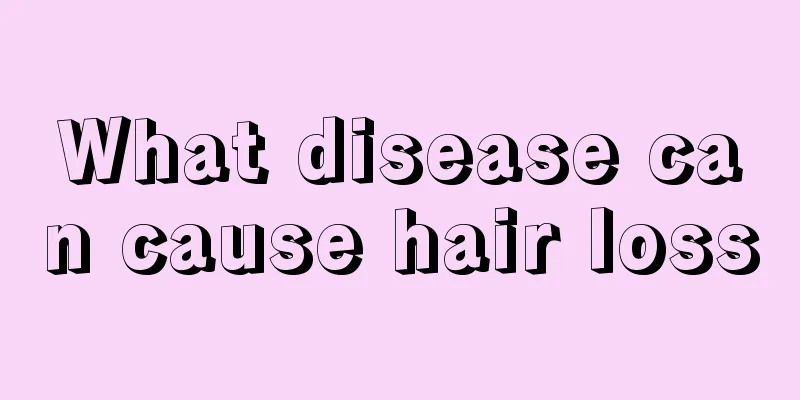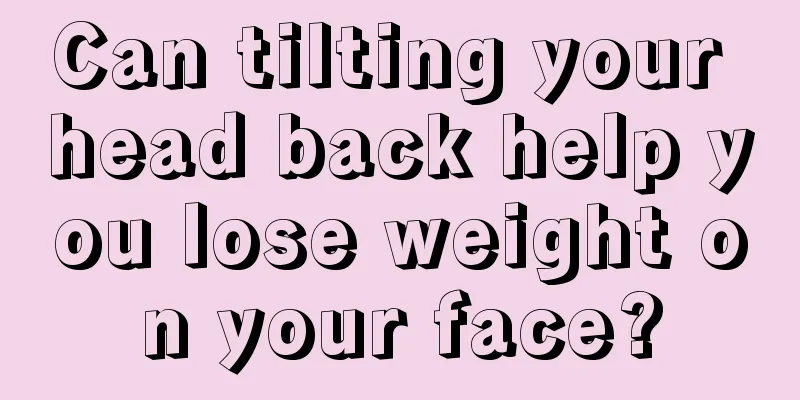What disease can cause hair loss

|
In autumn, many people will find that their hair is falling out severely. This is usually due to seasonal reasons. However, if you suffer from frequent hair loss, in addition to excessive stress, it may also be due to physical reasons. Clinically, it is found that many anemia patients suffer from hair loss, and female patients with polycystic ovary syndrome also experience hair loss. This article introduces several diseases that can cause hair loss in the human body. Let’s take a look. What diseases can cause hair loss? 1. Anemia. Experts say that iron supplementation can help improve symptoms of anemia. Lack of vitamin C, intake of caffeine or alcoholic beverages are not conducive to iron absorption. It is recommended to drink juice and eat iron-rich foods to restore hair growth. 2. Eating disorders. Reducing food intake will lead to a decrease in blood flow to the scalp, which in turn affects the normal growth of hair. In severe cases, it can cause hair to lose its luster or even fall out. Experts say hair loss is rarely permanent, but eating a balanced diet and consuming plenty of protein is key to preventing it. Hair is made of protein, and when hair follicle protein is at its lowest, it is particularly important to consume more protein (especially breakfast). In addition, the diet should be rich in vitamins (especially B vitamins), zinc and important fatty acids. 3. Polycystic ovary syndrome. Polycystic ovary syndrome in women is caused by excessive levels of male hormones, and patients will experience symptoms of thinning hair on the forehead and top of the head. This situation mostly occurs in patients with a family history of hair loss. Experts say that patients lose hair on their heads, but hair on their faces and bodies grows wildly. Medications that lower male hormones and scalp massages to promote blood flow can help patients regrow their hair. 4. Thyroid disease. The first symptom of thyroid dysfunction is hair loss. Too much or too little thyroid hormone can affect metabolism and normal hair growth. Since all hair follicles are affected, hair loss is not a localized phenomenon. Experts say medications and other treatments can help alleviate the condition. In order to restore your hair to its original state, it is best to consume more protein and do a head massage every morning. 5. Stress syndrome. Stress can cause premature graying of hair. When under stress, the human body releases a variety of hormones that will affect the absorption of B vitamins and affect hair pigmentation. Stress syndrome can lead to alopecia - the body's immune system mistakenly attacks scalp cells, causing large clumps of hair to fall out. Mental relaxation and taking vitamin B complex can improve the problem of premature gray hair. Experts say that the vast majority of hair loss patients will have certain endocrine abnormalities. When you find yourself having symptoms of hair loss, you should first consider regulating your endocrine system. Only when your endocrine system remains normal can your hair continue to grow normally. If the endocrine disorder is severe, you should consider some medical treatment to relieve it. |
<<: What to eat when you are under stress and losing hair
>>: What supplements are needed for hair loss
Recommend
How to choose the right lipstick for yourself
Many female friends have lipstick. Some more fash...
What are the early symptoms of laryngeal cancer
Although our current medical level can effectivel...
How to choose the treatment method for liver cancer
Liver cancer is a difficult disease to treat. Wit...
What kind of personality is sentimental
There are always some sentimental people around u...
How to treat corns on the feet?
Corns are very common. Many people get corns on t...
What is the reason for shaking hands when holding things
In life, we often see some people who have fallen...
What is the reason for spitting black phlegm in the morning
From a health perspective, if everything is norma...
Can adults use baby prickly heat powder?
Summer is a season that people love and hate, bec...
How pancreatic cancer metastasizes
Pancreatic cancer can metastasize in the followin...
There is a hard lump on the child's ear. What's wrong? It doesn't hurt or itch.
If a child has a hard bump on their ear that does...
Why does my upper lip suddenly become numb and swollen?
In life, because there are so many kinds of food ...
What to do if your eyes become bloodshot when you stay up late, how to relieve it
Many friends need to stay up late to complete the...
What fruit is good for liver disease? This fruit is the strongest nemesis of liver cancer
Liver cancer is a very terrible disease. Many peo...
Are house spiders poisonous?
Spiders are also very scary insects, especially f...
How to treat negative tuberculosis
Tuberculosis is an infectious disease. Patients w...









